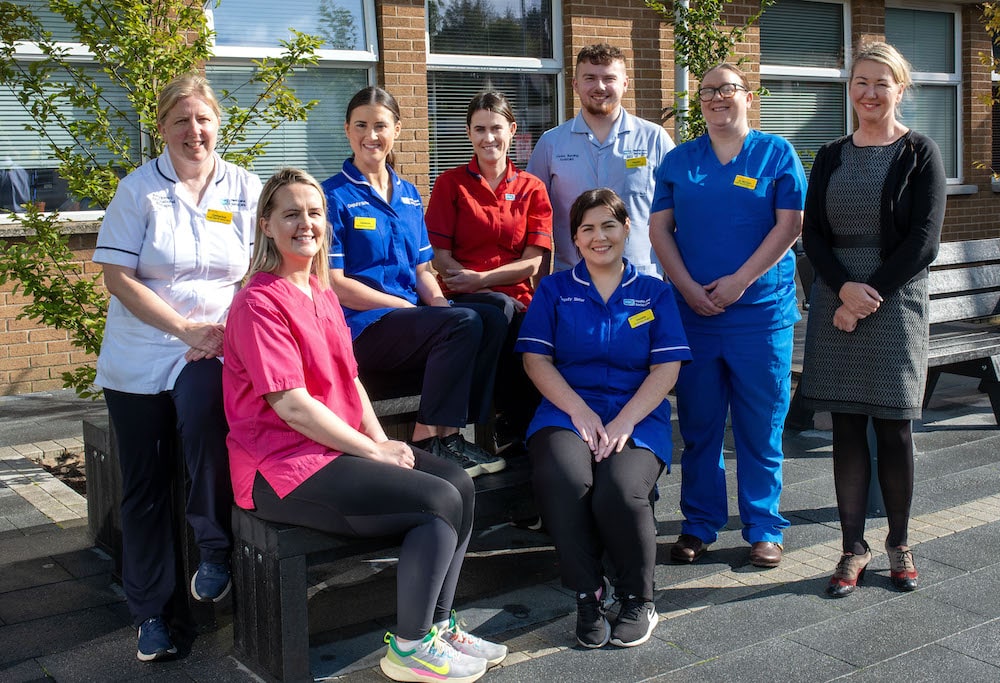
The Southern Trust is developing its ‘hospital at home’ service in the Newry and Mourne area.
Since it was set up, the ‘Acute Care at Home’ service has prevented over 12,000 hospital admissions and supported earlier discharge for more than 2000 people.
As the first Consultant Geriatrician led service of its kind in Northern Ireland, the team aims to respond to referrals from GPs, Northern Ireland Ambulance service and local hospitals within just a few hours.
The team has the same access to diagnostic and laboratory services as in a hospital setting and can treat patients over the age of 65 with a wide range of acute illnesses in residential, nursing or patients own homes. They also have access to mobile diagnostic equipment to carry out scans, take blood tests or organise other investigations and treat a range of conditions like chest infections, pneumonia or dehydration in patients’ own homes.
The Acute Care at Home service has been expanding across the Southern area since it was originally set up as a pilot in 2014. Operating seven days a week from 8am to 11pm, they look after over 30 patients daily.
With additional staff recently recruited, referrals to the team have been increasing in the Newry and Mourne area. The team are working closely with GPs to encourage referrals and a geriatrician and specialist nurse are now based in Daisy Hill Hospital’s Emergency Department to offer more patients their support.
Dr Patricia McCaffery, Divisional Medical Director for Older People Services in the Southern Trust says: “A hospital admission can be traumatic and disruptive for anyone, but particularly for an older person who may be less mobile, or for those who have dementia. We also know there are associated risks for patients from an unnecessary or longer hospital stay than is needed, for example infection, increased delirium and deconditioning muscle strength.
“Through the Acute Care at Home service, we are transforming the way we offer unscheduled care to our increasing number of older residents who are living with more complex needs. We hope that by offering high quality care in their own home environment, we will promote a better quality of life for our older population, avoiding more stressful admissions and freeing up beds in our very busy acute hospitals when it is safe to do so.”
The Acute Care at Home team includes Consultant Geriatricians, Speciality Doctors, Specialist Nurses, Staff Nurses and Health Care Assistants, Pharmacists , Occupational Therapists, Physiotherapists, Speech and Language therapists, Dietitians and works closely with many other Community Services.
The team are continually developing their service to support as many patients as possible. They are currently trialling a ‘virtual ward’ system to support earlier discharge of suitable patients from hospital and from acute care at home, to free up capacity for more patients. The new approach allows the team to continue to remotely monitor patients who have been discharged from acute care and no longer require face to face treatment.
They have also recently hosted a focus group with carers and patients from the Newry area, to find out what is working well and to identify any areas of improvement. The team would like to thank everyone for taking the time to participate and providing some very valuable and constructive feedback.
One woman who has used the service said that she preferred using acute care at home as you have your family around you.
“You can get up and down as you please rather than just sitting out in a chair,” she said. “Your mood can go down in hospital and you are just waiting until visiting times come around, at home you can do what you need to do.”
The wife of a former patient said: “My husband started using the team as he had COPD and difficulty breathing, on oxygen. He was seen straight away. The team were referred to and within a couple of hours everyone was there. He enjoyed the company of the team coming in and was under their care when he passed away. He was happy to be home.”
Another patient added: “I had been in hospital with a urinary tract infection. I was offered early discharge home, I wasn’t sure about it, had been asked before and declined but decided to try it this time. I was very pleased with the support. Doctors and nurses came daily for bloods. I had two weeks of drip and antibiotics which helped to clear sepsis and occupational therapy and physiotherapy to help me get back into and steady on my wheelchair.”



